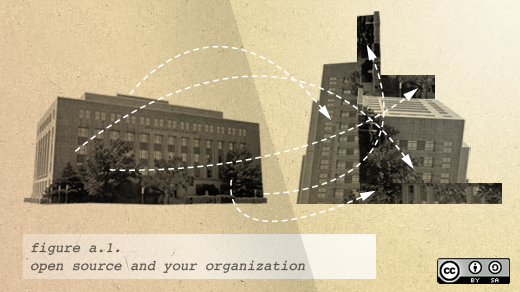In the open source universe, using terms such as FLOSS (Free/Libre and Open Source Software) is common and represents a casual conflation of the terms open source and free software, which are often used interchangeably. I would be remiss if I didn't also admit that I have been guilty of same. I won't be doing that anymore—or at least I'll try not to—for a simple reason: Using the terms interchangeably is dangerous to the goals of free software and open media advocates (read "anti-DRM"). To continue this practice is to undermine beliefs that are fundamental to free software and associated movement.
Free software is about freedom
Free software is a social movement, with nary a hint of business interests—it exists in the realm of religion and philosophy. Free software is a way of life with a strong moral code. Central to the spirit of free software is the idea that everyone should be able to use, modify, and share, with a defined limitation that you can't modify without sharing. This is the origin of the "free software is a virus" meme that makes the GNU GPL seem especially scary to some business folks. To embrace free software is also to embrace sharing culture and mandate sharing, which is a step too far for most businesses. The point of free software was to undermine the existing order of proprietary Unix vendors and enforce principles of sharing. And when it comes to espousing that freedom, it's difficult to embrace the free software culture and philosophy without also acknowledging the onging fight for unlocked devices, open media formats, net neutrality, and safety from private as well as government surveillance. For the rest of this post, I'll use "Free Software" as shorthand for all of those movements
Open source is about something else entirely: Supply chain efficiency
When I wrote There is no Open Source Community a decade ago, I asked the question, "Why do developers release open source code?" As it turns out, there are good reasons for doing so from an operations standpoint.
To embrace open source is to embrace a development model that utilizes a decentralized supply chain. Whereas before, proprietary vendors would control the entire software supply chain in-house, the open source model directly refutes that approach. The open source model is about using common components of multiple origins to achieve higher efficiency and agility in creating software-based products and services.
Initially, open source projects did heavily use GPL'd software, due to the fact that the GNU project was started some 10 years before the first Linux kernel, and at least 15 years before the term open source was coined. The effect of this head start was that by the time open source as a business-friendly concept gained steam, there was already a wealth of GPL'd code—not to mention a well-developed culture of sharing.
That there is now a trend of new open source projects migrating away from copyleft GPL-style licenses toward "liberal" Apache-style licenses should come as no surprise. In retrospect, this was inevitable. In a world defined by business interests and not philosophy, enforced sharing doesn't really make sense. Sure, one could argue that it does. After all, lots of companies have formed profitable ecosystems around GPL'd GNU and Linux code. But let's assume that most business types disagree with the whole enforced-sharing bit.
In the Apache-style open source model, developers can choose whether or not to release their modifications. They often do, simply because they have realized the benefits of participating in open source ecosystems—but there are many who sometimes do not. In an open source world, this simply doesn't matter. If the point of open source development is to optimize your supply chain and economies of scale, who cares about sharing?
Open source victory
It's important to remember that in The Cathedral and the Bazaar Eric S Raymond specifically called out the open source model as superior, which was the beginning of the great cultural divide: Open source was all about better software and "given enough eyes, all bugs are shallow"; and free software was about an enlightened existence through sharing. The point of view that open source was a superior model turned out to be mostly correct, as open source has become the preferred model for technology innovation. Open source processes could give vendors a competitive advantage, if used properly, and open source principles could allow projects to function more efficiently.
Ironically, it's this impressive open source victory—or at least our interpretation of it—that presents a real threat to free software. When these terms are used interchangeably, there is no room for nuance or differentiation. Thus, the open source victory becomes a free software victory, without the slightest question of whether that actually is the case.
But has free software actually won? Let us consider an alternative, that victory for free software looks very different from open source. If an open source victory looks like higher efficiency and more innovation in open source ecosystems, what does a free software victory look like?
If free software 'won'
If we start with the premise that free software is about a philosophy of sharing and a moral code built around that, then what would it mean if the philosophy of free software was just as successful as open source principles? If I'm correct that they are different, then surely the success of this philosophy and moral code would manifest itself in ways different from what we see now.
In a world in which free software wins, are locked-down cloud architectures dominant? Would most hand-held devices be proprietary and difficult to change? Would it be difficult to use any service on any platform? Would we so easily hand over our privacy to media companies? Why, then, in a world in which open source is hyper-successful, are all of the above true? If we declare that open source has won—and I believe it's safe to do so—how could we possibly declare that free software has also won? This is where the conflation of terms is actively toxic. By using them interchangeably, you are taking the air out of the sails of free software advocates everywhere who want to ensure sharing in the cloud, freedom on the web, equal access to technology, and improved privacy for everyone.
When free software advocates speak up, many open source supporters would rather that they just shut up and went away. I was in a conversation some months ago in which I mentioned that we needed to educate people about open source principles. My mistake. See what conflation of those two things gets us? One technology executive responded, "Do we really need that anymore?" The impression among some open source supporters is that, because open source has won, the "free market" will take care of it, and we needn't worry ourselves with this philosophical stuff. Thus, there's no need to lobby governments on standards, privacy, and free software, because, hey, the invisible hand of the market is guiding us all in the right direction. With the success of open source due to market trends, there is far too much lackadaisical thinking about moving technology-culture forward.
Also, I can't resist pointing out that this type of magical thinking is eerily similar to Francis Fukuyama's theory in 1989 from The End of History and the Last Man, that the world's societies and nation states were moving inexorably towards more freedom and democracy. How has that worked out for two-thirds of the world's population?
Free software is important in its own right
We risk losing an entire generation to a rental culture, not actually owning anything digital or controlling the means by which we can interact with our media and devices. By not embracing free software ideals, we risk undermining the necessary work done by free software advocates. The ideals of free software necessitate a modification and sharing culture to keep our corporate overlords in check, something we're rapidly losing on modern cloud, web, and IoT platforms. If we were able to mandate free software principles, frankly, the world would be a better place. I wouldn't have to use a specific platform just so I could access technology services I paid for. Poor students around the world wouldn't face more obstacles to educational opportunities. Underrepresented communities would have more power to control their own destiny and create successful communities that they could leverage as a counterweight to the rest of the world that would rather institute the status quo.
We should all be working to ensure that we own the technology on our devices, that we own our information, and that we can defend our privacy. Whoever owns the information that governs our lives owns the pathways to our thoughts and mechanisms for future monopolies, which does have a real economic impact.
Well, I guess I couldn't get away from the economic argument after all: Ignore free software philosophy and ideals, and risk a terrible future with imposed limits on freedom of expression, thought, and, yes, commerce.






39 Comments